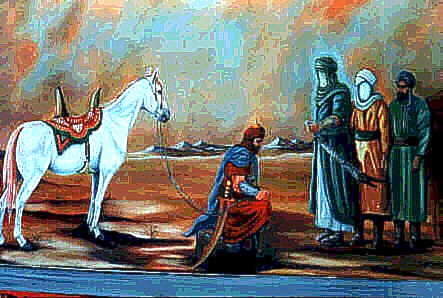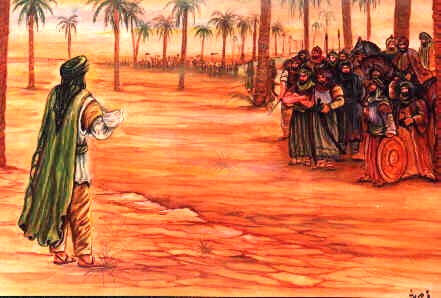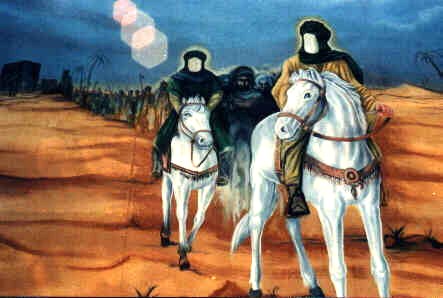Part 8 - Al-Hur bin Yazid seeks Forgiveness
He continued with his address stating, "By the Almighty, soon you have done away with us, you will be shaken like a stone mill, like an axis."
"This is a covenant passed, to me from my grandfather the Messenger of God (SAW) through my father. 'You may resolve upon your affair and gather your partners then let not your affair be in darkness to you, then have it executed against me and do not reflect (any further)'. (10:71) 'Surely I rely on Allah, my Lord and yours; there is no living creature but He holds it by its forelock; surely, my Lord is on the right path'. (11:56)"
Then he raised his hands towards heaven and said, "Oh Lord! give them no rain, afflict them with barren years like the years of Yusuf (Joseph) - (draught and famine). Give mastery over them to the boy from Thaqeef (reference to Al-Hajjaj al-Thaqafi), who will give them bitter water (torment them) because they branded us as liars and let us down. You are our Lord; we rely on You and unto You we return."
He returned to his camp and was surrounded by his brethren and followers. He said to them, "The folk are intent on fighting you. May Allah have mercy on you." Then he appealed for help and support.
When Al-Hur bin Yazid ar-Riyahi heard his plea for help he went to Omar bin Sa'ad and asked him, "Are you fighting this man?" Ibn Sa'ad replied, "Yes, by the Almighty! a kind of fighting the bottom line of which is heads will roll and limbs will be chopped".
Al-Hur said, "Are you not satisfied with what to you?" Ibn Sa'ad replied, "Had it been for me I would have accepted his proposal. But your master is adamant".
Al-Hur then stood a middle ground and shuddered, gradually drawing nearer to Hussain (A). One of his companions asked him, "What are you doing?" Al-Hur answered, "I am giving myself the choice between heaven and hell; by the Almighty I choose nothing short of heaven so much so that I do not mind if I were chopped into pieces and burnt. He then spurred his horse aiming towards Hussain (A) with his lance turned around, his bow upside down. He stood before Hussain (A), eyes cast down, and asked him, "0! could I but sacrifice myself for you, You son of the Messenger of Allah! I have been stalking you all the way. It was me who prevented you from going back (to where you came from), kept close watch on you, and roared on you in this place. I have never thought that the people would not agree to your proposition. Oh Lord! I turn to you in repentance for I frightened the hearts of Your friends, the offspring of Your Messenger."

"Oh father of Abdullah! I seek penitence from Allah for what I did. Do you, think that He will accept it? "Hussain (A) answered, "Yes, he will accept your repentance".
He then asked Hussain (A) for permission to address the belligerent camp; he was given it. He called in the highest pitch of his voice, "Oh, people of Kufa! You called on this good servant of God; when he responded you welcomed him and claimed that you do not mind getting killed to spare him. Then you changed your minds, transgressing against him with a view to killing him. You put a stranglehold on him, stretched his patience, and besieged him to prevent him from seeking a safe haven in Allah's vast land. He became like a hostage. You denied him, members of his household, and companions access to the waters of the River Euphrates from which Jews, Christians, and fire worshippers drink, and pigs and dogs wade in. Yet Hussain, his family, and companion, are dying of thirst. What misery you inherited the offspring of Mohammad (S)! May Allah not give you drink on the day of thirst." A group from the camp of Ibn Sa'ad attacked him shooting at him with arrows forcing him to retreat.
Omar bin Sa'ad drew nearer to the camp of Imam Hussain (A) and called Draid, the bearer of the standard, to move forward. He then took an arrow, placed it in his arch and released it in the direction of Hussain's (A) camp, and said, "Bear witness for me with the Emir that I was the first to shoot." The arrows then followed like rain, causing injuries among the companions of Imam Hussain (A).
Having made sure that the enemy is intent on fighting them, Hussain (A) ordered his followers, "Rise to certain death; may Allah have mercy on you; the arrows are the messengers of those people to you".
The companions of Hussain (A) waged a campaign and fought for an hour or so. When the dust settled, there were fifty dead. When Hussain (A) saw this elite group of his companions killed he held his beard and said, "Allah's wrath on the Jews was great because they claimed that he had a son, on the Christians because they made him one of the trinity, on the Magians because they worshipped the sun and the moon, and on the people who were unanimous in the agreement to kill the son of their Prophets daughter. By the Almighty! I am not going to give in to them until I meet Allah blood-dyed".
"Your predilection for conceit
And profane wiles, entranced with deceit
Have driven me to prove, with sword, my case
To screw my courage to the sticking place.
When my sword, to act, is forced
My views, by the apostates, are endorsed.
Bathed in the foe's infernal blood
Zooms, imbrued, through the gory flood.
As I draw my sword (and wield)
premptorily the rivals yield.
A conquest, when I plan to clinch
To elude the battle the bravest flinch.
Launch an assault, and attack you do
A veritable rock will confront you.
In your quest to win; prevail
Assume the aggressive; charge; then fail
To feed hell's fire, be dispatched
Midst devils perform misdeeds, unmatched.
He continued with his address stating, "By the Almighty, soon you have done away with us, you will be shaken like a stone mill, like an axis."
"This is a covenant passed, to me from my grandfather the Messenger of God (SAW) through my father. 'You may resolve upon your affair and gather your partners then let not your affair be in darkness to you, then have it executed against me and do not reflect (any further)'. (10:71) 'Surely I rely on Allah, my Lord and yours; there is no living creature but He holds it by its forelock; surely, my Lord is on the right path'. (11:56)"
Then he raised his hands towards heaven and said, "Oh Lord! give them no rain, afflict them with barren years like the years of Yusuf (Joseph) - (draught and famine). Give mastery over them to the boy from Thaqeef (reference to Al-Hajjaj al-Thaqafi), who will give them bitter water (torment them) because they branded us as liars and let us down. You are our Lord; we rely on You and unto You we return."
He returned to his camp and was surrounded by his brethren and followers. He said to them, "The folk are intent on fighting you. May Allah have mercy on you." Then he appealed for help and support.
When Al-Hur bin Yazid ar-Riyahi heard his plea for help he went to Omar bin Sa'ad and asked him, "Are you fighting this man?" Ibn Sa'ad replied, "Yes, by the Almighty! a kind of fighting the bottom line of which is heads will roll and limbs will be chopped".
Al-Hur said, "Are you not satisfied with what to you?" Ibn Sa'ad replied, "Had it been for me I would have accepted his proposal. But your master is adamant".
Al-Hur then stood a middle ground and shuddered, gradually drawing nearer to Hussain (A). One of his companions asked him, "What are you doing?" Al-Hur answered, "I am giving myself the choice between heaven and hell; by the Almighty I choose nothing short of heaven so much so that I do not mind if I were chopped into pieces and burnt. He then spurred his horse aiming towards Hussain (A) with his lance turned around, his bow upside down. He stood before Hussain (A), eyes cast down, and asked him, "0! could I but sacrifice myself for you, You son of the Messenger of Allah! I have been stalking you all the way. It was me who prevented you from going back (to where you came from), kept close watch on you, and roared on you in this place. I have never thought that the people would not agree to your proposition. Oh Lord! I turn to you in repentance for I frightened the hearts of Your friends, the offspring of Your Messenger."

"Oh father of Abdullah! I seek penitence from Allah for what I did. Do you, think that He will accept it? "Hussain (A) answered, "Yes, he will accept your repentance".
He then asked Hussain (A) for permission to address the belligerent camp; he was given it. He called in the highest pitch of his voice, "Oh, people of Kufa! You called on this good servant of God; when he responded you welcomed him and claimed that you do not mind getting killed to spare him. Then you changed your minds, transgressing against him with a view to killing him. You put a stranglehold on him, stretched his patience, and besieged him to prevent him from seeking a safe haven in Allah's vast land. He became like a hostage. You denied him, members of his household, and companions access to the waters of the River Euphrates from which Jews, Christians, and fire worshippers drink, and pigs and dogs wade in. Yet Hussain, his family, and companion, are dying of thirst. What misery you inherited the offspring of Mohammad (S)! May Allah not give you drink on the day of thirst." A group from the camp of Ibn Sa'ad attacked him shooting at him with arrows forcing him to retreat.
Omar bin Sa'ad drew nearer to the camp of Imam Hussain (A) and called Draid, the bearer of the standard, to move forward. He then took an arrow, placed it in his arch and released it in the direction of Hussain's (A) camp, and said, "Bear witness for me with the Emir that I was the first to shoot." The arrows then followed like rain, causing injuries among the companions of Imam Hussain (A).
Having made sure that the enemy is intent on fighting them, Hussain (A) ordered his followers, "Rise to certain death; may Allah have mercy on you; the arrows are the messengers of those people to you".
The companions of Hussain (A) waged a campaign and fought for an hour or so. When the dust settled, there were fifty dead. When Hussain (A) saw this elite group of his companions killed he held his beard and said, "Allah's wrath on the Jews was great because they claimed that he had a son, on the Christians because they made him one of the trinity, on the Magians because they worshipped the sun and the moon, and on the people who were unanimous in the agreement to kill the son of their Prophets daughter. By the Almighty! I am not going to give in to them until I meet Allah blood-dyed".
"Your predilection for conceit
And profane wiles, entranced with deceit
Have driven me to prove, with sword, my case
To screw my courage to the sticking place.
When my sword, to act, is forced
My views, by the apostates, are endorsed.
Bathed in the foe's infernal blood
Zooms, imbrued, through the gory flood.
As I draw my sword (and wield)
premptorily the rivals yield.
A conquest, when I plan to clinch
To elude the battle the bravest flinch.
Launch an assault, and attack you do
A veritable rock will confront you.
In your quest to win; prevail
Assume the aggressive; charge; then fail
To feed hell's fire, be dispatched
Midst devils perform misdeeds, unmatched.


اترك تعليق: